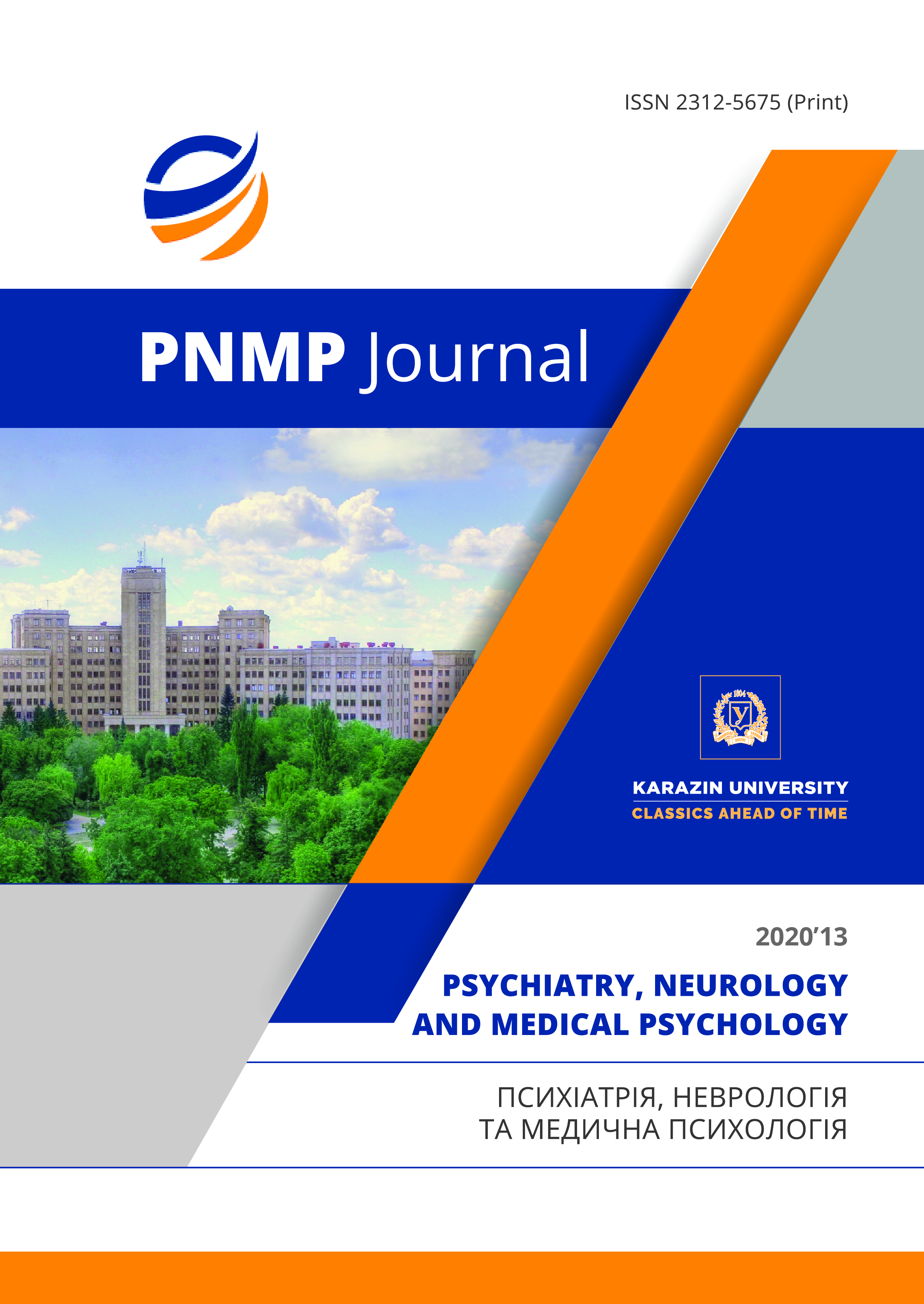Features of the use of choline alfoscerate in the complex correction of cognitive disorders in patients with alcohol dependence with encephalopathy
Abstract
The results of studying the dynamics of clinical and psychopathological manifestations, cognitive disorders, brain electrogenesis in patients with alcohol dependence under the influence of therapy according to the treatment standards (I group) and using the drug "Cereglia" in complex correction (II group) are shown in the work. As a result of treatment revealed positive dynamics of psychopathological symptoms relief in both groups was revealed; in patients II group improving electrogenesis brain manifested a decrease of irritatie, regress polymorphic paroxysmal activity, the representation of slow-wave complexes, normalization of the ratio of alpha- and beta-rhythms, the emergence of regional differences and the reactions of absorption on the functional load clinically manifested by increase of functional activity of the brain and improving cognitive function (improving ability to work and steadfastness of focus, logic of judgments, the correctness and validity of generalizations, processes of semantic memorization, the ability to highlight the main meaning of the perceived material, the ability to analyze, understand and put into words the information received), before the performance standards, the test execution time was significantly shorter in group II patients than in group I patients (p<0.05) and was closer to the test execution time in the control group. It was found that the dynamics of cognitive functions under the influence of treatment is a marker of the degree of manifestations of encephalopathy and evaluation of the effectiveness of therapy with the use of the drug "Cereglia".
Downloads
References
Markozova L. M., Linsky I. V., Baranenko A.V. Analysis of the dynamics of prevalence and incidence of mental and behavioral disorders due to the use of psychoactive substances in Ukraine for the period 1990-2014. Psychiatry, neurology and medical psychology. 2017. Vol. 4 (7), pp. 52-58. [In Ukr.]
Markozova L. M. The problem of dependence on alcohol and other psychoactive substances. Health of Ukraine. 2016. Vol. 1 (36), pp. 54-55. [In Ukr.]
Shcherbakova E. M. Global trends in alcohol consumption, WHO estimates 2018. Demoscope Weekly. 2019, no 813-814. URL: http://demoscope.ru/weekly/2019.0815/barom01.php [In Russ.]
The WHO is alarmed by Europeans' addiction to alcohol. WHO report. 2019. URL: https://news.un.org/ru/story/2019/09/1362412 [In Russ.]
World health statistics 2017: monitoring health for the SDGs, Sustainable Development Goals. Geneva: World Health Organization. Monitor info. 2017. URL: https://apps.who.int/iris/bitstream/handle/10665/255336/9789241565486-eng.pdf
Markozova L. M. Features of cognitive disorders in groups of people with alcohol dependence with different ability to stay in the cohort. Ukrainian Bulletin of Psychoneurology. 2015. Vol. 23, no. 3(84), pp. 144-145. [In Ukr.]
Kameneva N. N., Kutashov V. A. Modern approach to treatment of toxic alcoholic encephalopathy. Young scientist. 2015. No 19, pp. 274-277. URL: https://moluch.ru/archive/99/22240 [In Russ.]
Boldyreva G. N. Electrical activity of the human brain in case of damage to diencephalic and limbic structures. Science, MIAK "Science/interperiodics", 2000. p. 182. [In Russ.]
Vorobyova T. M., Paikova L. N., Filimonova N. B. Features of the psychophysiological state in persons with an attraction to alcohol and drugs. Mental health. 2009, no 2, pp.43-48. [In Russ.]
Vievsky A.M., Sosin I. K., Vievsky A.M. [et al.]. Protocols for providing medical narcological care; Standards of medical care in Ukraine. 2009. URL: //http://medstandart.net/browse/3277 [In Ukr.]
T. F. Babor, J. C. Higgins-Biddle, J. B. Saunders [et al]. AUDIT: The Alcohol Use Disorders Identification Test; Guidelines for use in Primary Care; Second Edition World Health Organization. Department of Mental Health and Substance Dependence. 2001. p. 99.
Sullivan JT, Sykora K, Schneiderman J, Naranjo CA, Sellers EM. Assessment of alcohol withdrawal: the revised clinical institute withdrawal assessment for alcohol scale (CIWA-Ar). Br J Addict. 1989. Vol. 84(11), pp. 1353-1357. DOI: 10.1111/j.1360-0443.1989.tb00737.x
Derogatis L. R., Lipman R. S., аl Derogatis L. R. SCL–90: An outpatient psychiatric rating scale. Preliminary report. Psychopharmacology Bulletin. 1973. Vol. 9, no 1, рр. 13–27.
Dudko T. N, Puzienko V. A., Kotelnikova L. A.. Differentiated system of rehabilitation in narcology: methodological recommendations. 2001. 38 p. [In Russ.]
Lapach S. N., Chubenko A. V., Babich P. N. Statistical methods in biomedical research using Excel. 2000. 320 p. [In Russ.]
Zhirmunskaya E. A. Clinical electroencephalography. 1991. 118 p. [In Russ.]
Markozova L. M., Vasilyeva A. A., Lesnaya N. N. Dynamics of cognitive functions, psychopathological manifestations and indicators of quality of life in people with alcohol dependence under the influence of cognum-500. Psychiatry, psychotherapy and clinical psychology. 2018. Vol. 9, no 3. pp. 422-435. [In Russ.]

